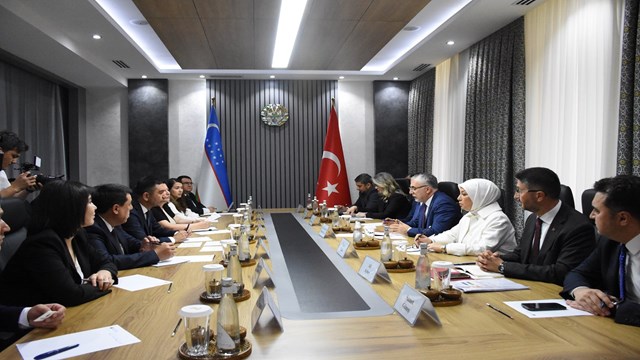
First Meeting of the Türkiye-Uzbekistan Joint Working Commission Held in Tashkent
First Meeting of the Türkiye-Uzbekistan Joint Working Commission Held in Tashkent
The first meeting of the Türkiye-Uzbekistan Joint Working Commission was held in Tashkent, co-chaired by Türkiye’s Minister of Labour and Social Security, Vedat Işıkhan, and Uzbekistan’s Minister of Poverty Reduction and Employment, Batir Zahidov.
At the opening of the meeting, held at the Ministry of Poverty Reduction and Employment, Minister Işıkhan emphasized the importance Türkiye places on developing close relations with Uzbekistan. “In line with the strengthening ties between our countries, enhancing employment and social security mechanisms is our common goal,” he said.
Işıkhan underlined that efforts to strengthen bilateral relations are ongoing. He noted that the cooperation agreement signed in 2022 laid the foundation for mutual knowledge exchange and steps to improve social rights in the fields of labor and employment.
He stated that the Joint Working Commission was established to implement this agreement and that the first meeting of the commission is an important tool for enhancing cooperation between the ministries and solving potential issues.
Highlighting the value of sharing experiences, Işıkhan said: “Our goal is to maintain our close cooperation through result-oriented, concrete steps.”
He expressed his belief that the two-year action plan to be signed following the meeting would contribute to deepening cooperation, as it includes tangible initiatives. He also stressed that, as ministers, they would closely follow the implementation of both the cooperation protocol and the action plan.
He added that negotiations are ongoing for the ratification of a bilateral social security agreement, which would regulate relations in this field and help protect the rights of citizens in both countries.
“We are pleased to share our knowledge and experience with Uzbekistan in every area within our scope of responsibility and to evaluate activities that will provide maximum benefit to our citizens,” Işıkhan concluded.
For his part, Minister Zahidov stated that the relationship between the two ministries has rapidly developed in recent years. He emphasized the importance they place on sharing knowledge and expertise with Türkiye in the areas of labor and social security.
Zahidov noted that the Joint Working Commission meeting is a concrete example of these efforts and that it will serve as an important mechanism to strengthen cooperation on issues such as knowledge exchange, improvement of legal frameworks, and expert exchange.
Protocol Signed for the First Meeting of the Joint Working Commission
Following the meeting, Ministers Işıkhan and Zahidov signed the Protocol on the First Meeting of the Türkiye-Uzbekistan Joint Working Commission, which includes the Action Plan for the 2025–2026 period.
Speaking at the signing ceremony, Işıkhan expressed his pleasure in being in Uzbekistan, the homeland of renowned scholars such as Imam Bukhari, Al-Khwarizmi, Al-Biruni, Ibn Sina, Ali-Shir Nava'i, and Ulugh Beg. He noted that Uzbekistan, with its young and dynamic population, is located at the heart of Central Asia and is gaining increasing regional and global significance.
Işıkhan also proudly recalled that Türkiye was one of the first countries to recognize Uzbekistan’s independence.
He said, “The friendship between our President Recep Tayyip Erdoğan and Uzbekistan’s President Shavkat Mirziyoyev represents the newest and strongest link in our centuries-old brotherhood. Our relations with Uzbekistan are developing day by day within the framework of a 'comprehensive strategic partnership based on fraternal ties,' opening new areas for cooperation.”
Referring again to the 2022 cooperation agreement, Işıkhan reiterated that the first meeting of the Joint Working Commission marks a crucial step in enhancing ministerial ties and resolving bilateral issues.
He also stated that Türkiye continues to share its experience and expertise in fields such as occupational health and safety, inspection and guidance services, active labor market policies, vocational qualifications, and the transformation of skills into professions.